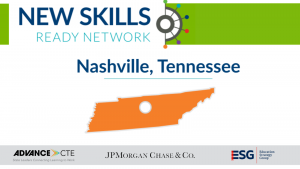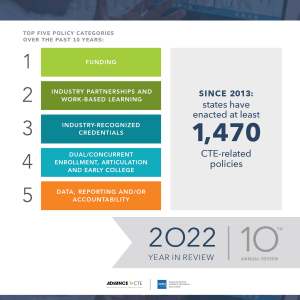This week Advance CTE’s Board of Directors President Laura Scheibe testified on Capitol Hill. Elsewhere, efforts to fund federal programs later this year continue while the House examines the U.S. labor market and the U.S. Department of Education (ED) makes a series of new announcements.
 Advance CTE Board President Testifies Before Congress
Advance CTE Board President Testifies Before Congress
On Wednesday, March 29, Laura Scheibe, Advance CTE’s Board of Directors President and South Dakota’s State Director for Career Technical Education (CTE), testified before the House Appropriations, Labor, Health and Human Services, Education and Related Agencies (Labor-HHS-ED) Subcommittee regarding rural workforce development issues and the role her state’s technical college system has in providing more quality CTE opportunities for learners. The Labor-HHS-ED Subcommittee is the primary entity in the House with responsibility for overseeing funding for the Carl D. Perkins Career and Technical Education as amended by the Strengthening Career and Technical Education for the 21st Century Act (Perkins V) as well as other federal education and workforce development programs falling under the purview of these agencies. Scheibe highlighted South Dakota’s CTE successes, including increased demand for programs, high completion rates, alignment with industry, and other key elements of the state’s CTE system that provides a high impact for its learners, many of whom reside in rural communities.
Scheibe’s appearance also highlighted the importance of the federal investment, made through Perkins V, that helps to make much of this possible. “This federal investment means our students learn on modern, industry-grade equipment so they come out workforce ready,” she noted in her testimony. She also highlighted the critical role Perkins has in supporting learners, noting “Perkins-funded Student Success Coordinators meet not just educational counseling needs, but transportation, affordable housing and navigating postsecondary as a first-generation student. For learners facing barriers, this can make all the difference to move from poverty into a family-sustaining career.” Scheibe also emphasized the important impact flexible Perkins funding can have to meet unique state and local needs saying, in part, “Additionally, our state’s Reserve Fund, a flexible portion of Perkins, is a critical tool that allows us to further expand activities benefiting our rural communities. At the secondary level, this funding supports innovation and equipment not otherwise possible for small districts.”
A full recording of the hearing can be found here, along with her written testimony. In recent weeks, Advance CTE and the Association for Career and Technical Education (ACTE) has also submitted written testimony to the Labor-HHS-ED Subcommittee calling for increased investment in Perkins V’s basic state grant program.
Take Action on FY24 Perkins Funding
Written by Association for Career and Technical Education (ACTE). Original post can be found here.
Each year, Sens. Richard Blumenthal (D-CT) and Tim Kaine (D-VA) lead a “Dear Colleague” letter to be sent to the Chair and Ranking Member of the Labor, Health and Human Services and Education Subcommittee of the Senate Appropriations Committee requesting robust funding for the Carl D. Perkins Career and Technical Education Act (Perkins) in the FY 2024 Labor, Health, and Human Services appropriations bill. We need your help again to secure an increase for Perkins that ensures CTE can continue to meet urgent workforce needs and serve as a critical part of the country’s economic growth. CLICK HERE to ask your senator to sign the “Dear Colleague” letter!
House Holds Hearing on Employment
On Tuesday, March 28, the House Education and the Workforce Committee held a hearing titled “Unleashing America’s Opportunities for Hiring and Employment.” Witnesses included economists and employer representatives who discussed the current state of the American labor market and debated policies that could directly impact current economic conditions. Of note, witnesses and committee members frequently highlighted the importance of high-quality educational pathways that lead to further opportunity and greater economic growth. In particular, members highlighted the importance of CTE programs and related pathways as a primary way to address ongoing labor shortages in key sectors of the economy. More information on the hearing, including an archived webcast, can be found here.
ED Unveils Work-Based Learning Grant Challenge
Earlier this month, the U.S. Department of Education (ED) formally launched the “Career Z Challenge”—a new grant competition intended to surface innovative approaches to expanding learner access to work-based learning opportunities. The multiphase grant competition will seek to identify promising best practices that can be scaled elsewhere in the nation. Local education agencies and schools that receive federal Perkins V funding are eligible to apply and to share their ideas for how to improve and expand work-based learning. More information on the challenge can be found here.
Senate Appropriations Outlines Hearing Schedule
In anticipation of further Congressional efforts to advance federal fiscal year 2024 (FY24) legislation this year, the Senate Appropriations Committee announced a series of hearings to examine the Biden Administration’s Congressional budget request. A hearing examining the U.S. Department of Education’s FY24 budget proposal is currently scheduled for May 11. A date has not yet been set for the U.S. Department of Labor. The full list of hearings can be found here.
ED Issues Teacher Pipeline Guidance
Recently the U.S. Department of Education’s (ED) Office of Career, Technical, and Adult Education (OCTAE) issued a “Dear Colleague” letter outlining ways state and local leaders can leverage federal funds to strengthen teacher pipeline efforts. Specifically, the guidance outlines ways that resources from the Perkins V can be used to support various teacher recruitment, retention and development initiatives. The letter can be found here.
Steve Voytek, Policy Advisor


 Your Help Needed – Support Non-Defense Discretionary Spending
Your Help Needed – Support Non-Defense Discretionary Spending The Nashville, Tennessee site of the
The Nashville, Tennessee site of the 